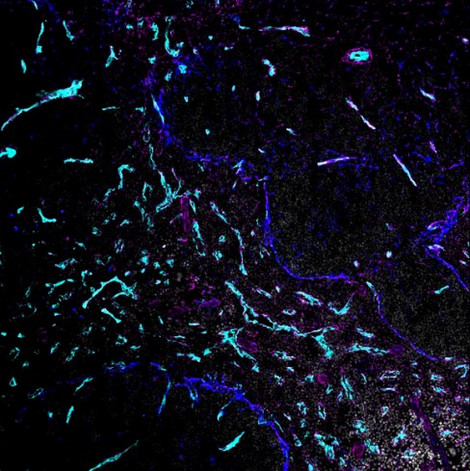AG Alsina-Sanchis
Blood vessels are present in all organs of the body and play an essential role during development, regeneration, and maintenance of organ homeostasis. In addition, blood vessels are influencing different steps of tumor progression. Blood vessels orchestrate their environment by communicating with the surrounding cells providing a large platform of membrane-bound proteins as well as secreted factors, summarized as “angiocrine factors”.
Our research group aims at discerning the cell-cell-communication between blood vessels and other stromal and immune cells. We want to understand how this crosstalk is affecting organ homeostasis and disease. More specifically, we focus on spleen and bone marrow. Identifying which angiocrine factors are responsible for specific changes in diseased versus healthy conditions will help to unravel the mechanisms by which blood vessels control organ homeostasis, as well as inflammation and immunosuppression during cancer progression.

Kontakt
Kontaktinformationen
- E-Mail-Adresse: elisenda.alsinasanchis(at)med.uni-goettingen.de
Publications (in chronological order)
Wiedmann, L*, De Angelis Rigotti, F*, Vaquero-Siguero, N., Donato E., Espinet E., Moll I., Alsina-Sanchis E., Bohnenberger H., Fernandez-Florido E., Mülfarth R., Vacca M., Gerwing J., Conradi LC., Ströbel P., Trumpp A., Mogler C., Fischer A*, Rodriguez-Vita J*.HAPLN1 potentiates peritoneal metastasis in pancreatic cancer. Nat Commun 2023.
Alsina-Sanchis E*, Mülfarth R*, Moll I, Böhn S, Wiedmann L, Jordana L, Ziegelbauer T, Taylor J, De Angelis Rigotti F, Stögbauer A, Giaimo BD, Cerwenka A, Borggrefe T, Rodriguez-Vita J*, Fischer A*. Endothelial Rbpj is essential for the education of tumor-associated macrophages. Cancer Res. 2022
Alsina-Sanchis E, Mülfarth R, Fischer A. Control of Tumor Progression by Angiocrine Factors. Cancers. 2021 [Cover story].
Alsina-Sanchis E, Mülfarth R, Moll I, Mogler C, Rodriguez-Vita J, Fischer A. Intraperitoneal Oil Application Causes Local Inflammation with Depletion of Resident Peritoneal Macrophages. Mol Cancer Res. 2021 [Cover story].
Alsina-Sanchis E*, García-Ibañez Y*, Riera-Domingo C, Figuereido A, Figueras A, Pujana MA, Casanovas O, Botella L, Riera-Mestre A, Graupera M, Viñals F. Phosphatidylinositol 3-kinase inhibition blocks vascular hiperplasia in Hereditary Hemorrhagic Telangiesctasia 2.Arterioscler Thromb Vasc Biol. 2018.
Figueras A, Alsina-Sanchis E, Lahiguera Á, Abreu M, Muinelo-Romay L, Moreno-Bueno G, Casanovas O, Graupera M, Matias-Guiu X, Vidal A, Villanueva A, Viñals F. A Role for CXCR4 in Peritoneal and Hematogenous Ovarian Cancer Dissemination.Mol Cancer Ther. 2018.
Alsina-Sanchis E, Figueras A, Lahiguera A, Gil-Martín M, Pardo B, Piulats JM, Martí L, Ponce J, Matias-Guiu X, Vidal A, Villanueva A, Viñals F. TGFβ Controls Ovarian Cancer Cell Proliferation.Int J Mol Sci. 2017
Alsina-Sanchis E, Figueras A, Lahiguera Á, Vidal A, Casanovas O, Graupera M, Villanueva A, Viñals F. The TGFβ pathway stimulates ovarian cancer cell proliferation by increasing IGF1R level. Int J Cancer, 2016.
de Rooij AM, Gosso MF, Alsina-Sanchis E, Marinus J, van Hilten JJ, van den Maagdenberg AM. No mutations in the voltage-gated Naq.7 sodium channel alpha1 subunit gene SCN9A in familial complex regional pain syndrome.Eur J Neurol, 2010.
Gosso MF, de Rooij AM, Alsina-Sanchis E, Kamphorst J.T, Marinus J, van Hilten J.J. and van den Maagdenberg AM. Systematic mutation analysis of seven dystonia genes in complex regional pain syndrome with fixed dystonia. J Neurol, 2010.